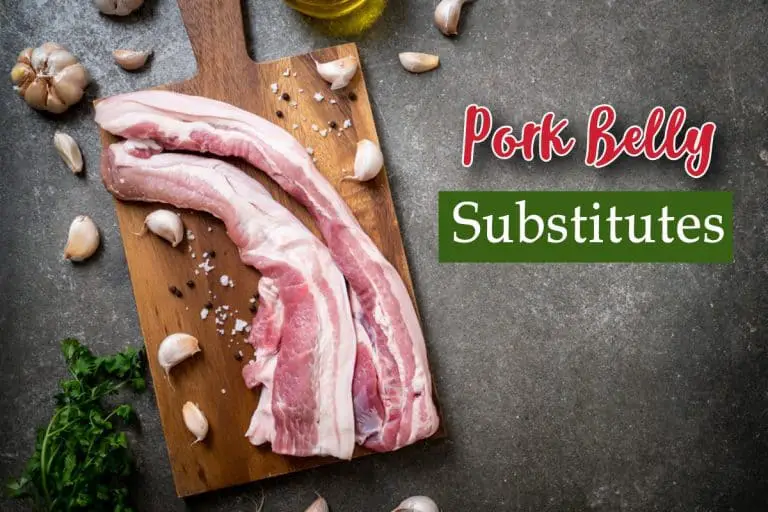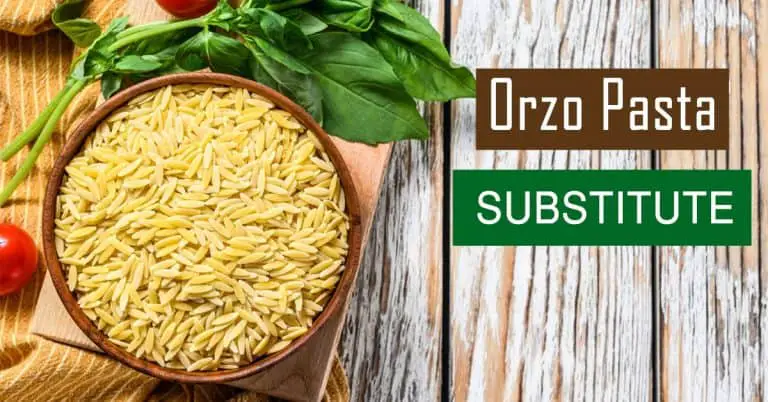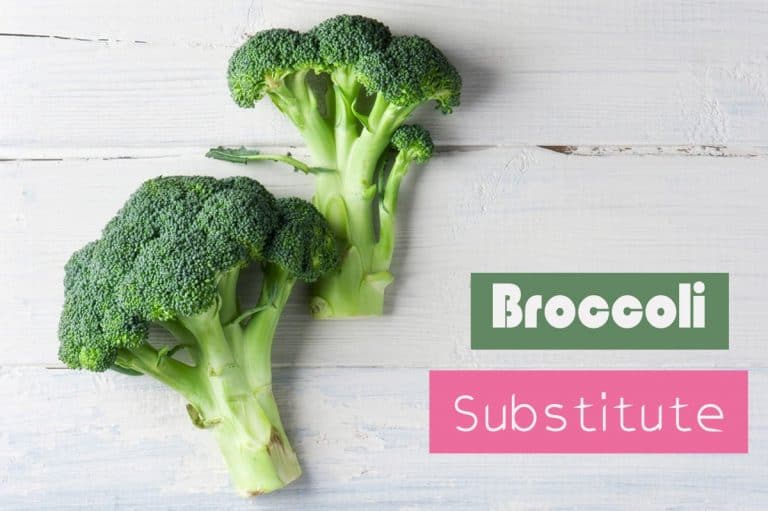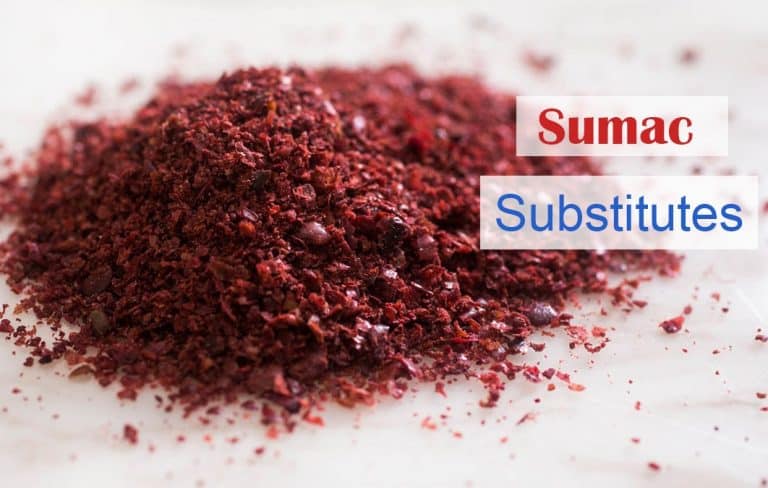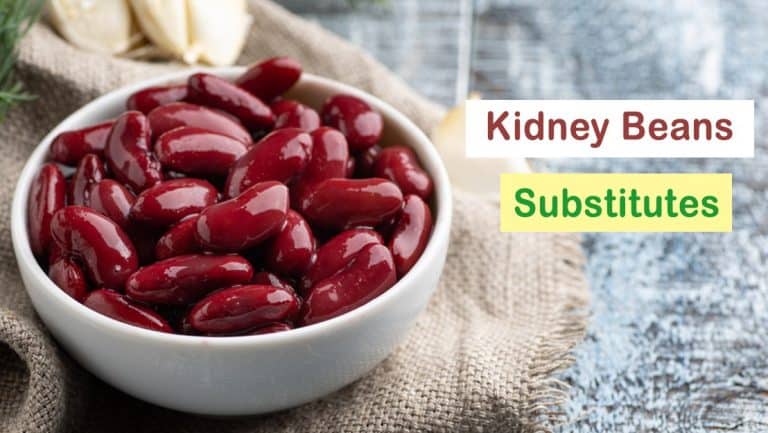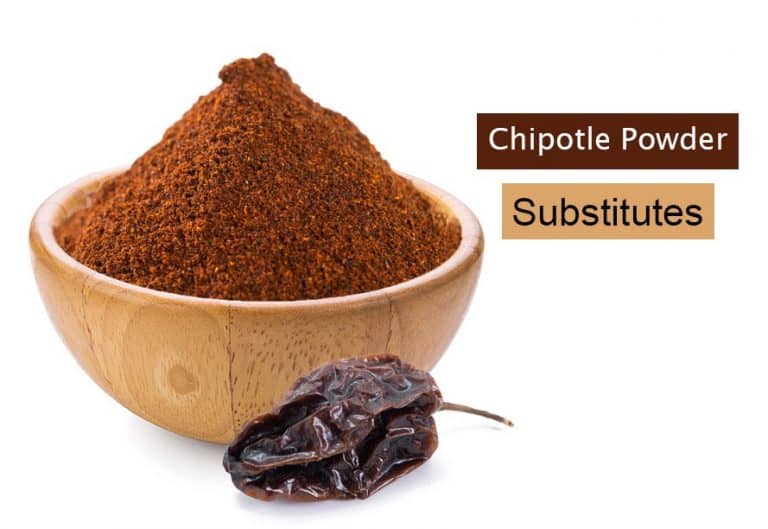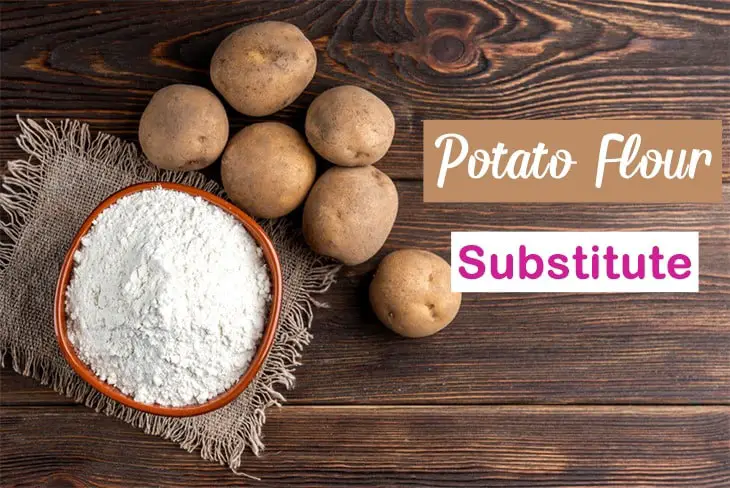
Potato flour is used in a wide variety of recipes, especially in baked goods. However, the ingredient is not always around and making your own batch of potato flour can be quite an endeavor. This calls for a substitute for potato flour.
Our article includes a list of the best alternatives for potato flour that work in all sorts of recipes. Without further ado, let’s get started!
The 10 Best Substitute For Potato Flour
Essentially, potato flour is pure starch. So you might think, if you can get your hands on any other form of starch, it will do. That’s the theory.
Starch from different sources reacts differently when being heated with water. Plus, potato flour carries a distinct flavor that starch made from tapioca roots or kennels doesn’t have. But no worries! Below are some substitutions for potato flour; check them out!
1. Mashed Potatoes
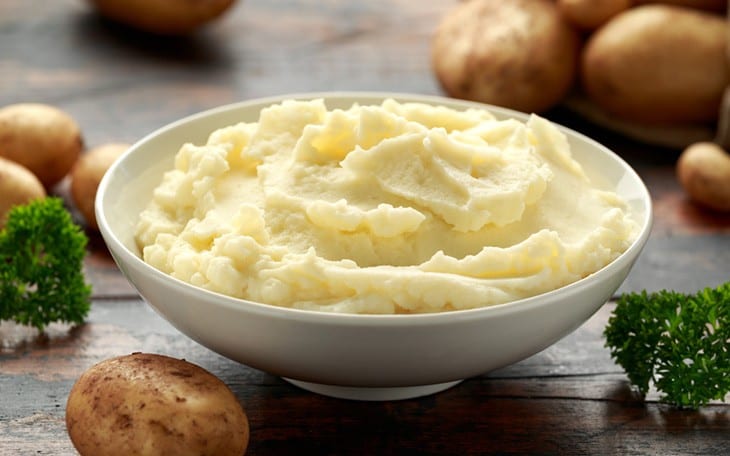
The closest substitute for potato flour is mashed potatoes. Not only will it bring out the flavor but also the texture of potato flour. Plus, mashed potatoes are full of nutrients that are good for your health.
However, you’re playing a wild card when using mashed potatoes because inaccurate water content can result in failed dishes. Mashed potatoes bring a lot of moisture to the baked goods. If you prefer your bread to be a bit moister than usual, consider using mashed potatoes.
Certainly, that’s the case for those who know their way around bread baking. Otherwise, mashed potatoes are better used as a thickener for sauce, gravy, or pie filling.
The health benefits of mashed potatoes include:
- Packed with vitamin C, vitamin B6, potassium, manganese, etc.
- Contain antioxidants to reduce the risk of heart diseases, diabetes, and certain cancers
- Improve blood sugar control
- Gluten-free
- Incredibly filling
2. Cornstarch
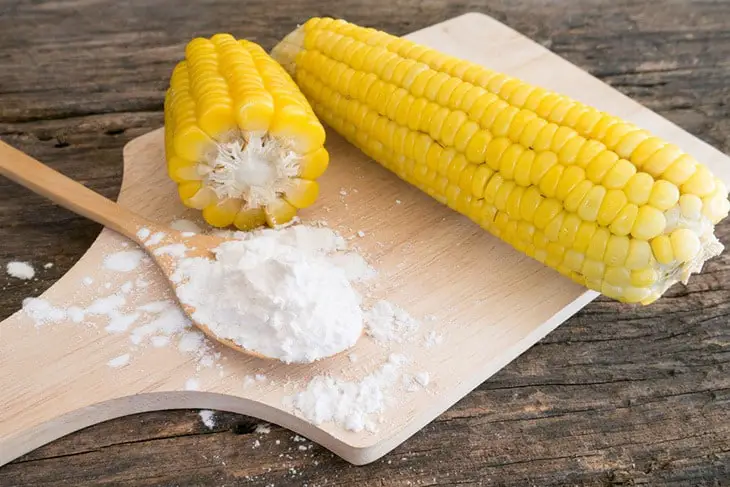
While mashed potatoes make the best potato flour substitute, cornstarch is an easy-to-find ingredient that is likely to be around in the kitchen.
It is a soft, gluten-free starch that has a neutral flavor. This ingredient is widely used in baked goods and makes a wonderful substitution for potato flour in bread as it retains the moisture level for a long time.
When you use cornstarch in the bread, it won’t go stale after a few days. Plus, the texture will be slightly softer than regular bread due to extra moisture.
Nonetheless, this substitute lacks the flavor that potato flour adds. So, if you’re okay with your bread lasting longer but not having a lot going in terms of flavor, the cornstarch is your best bet.
You can also use this ingredient for thickening soups and sauces. It will act the same way as potato flour when coating food items before you fry them.
The health benefits of corn starch are very limited. It contributes very few calories and no substantial vitamins or minerals. Nonetheless, if you want to gain weight quickly, corn starch can help you with that.
Since there won’t be any fiber, fat, or protein to lengthen the process of breaking carbohydrates into glucose, your body gets energy quicker when consuming corn starch than whole-grain carbs.
3. Tapioca Flour
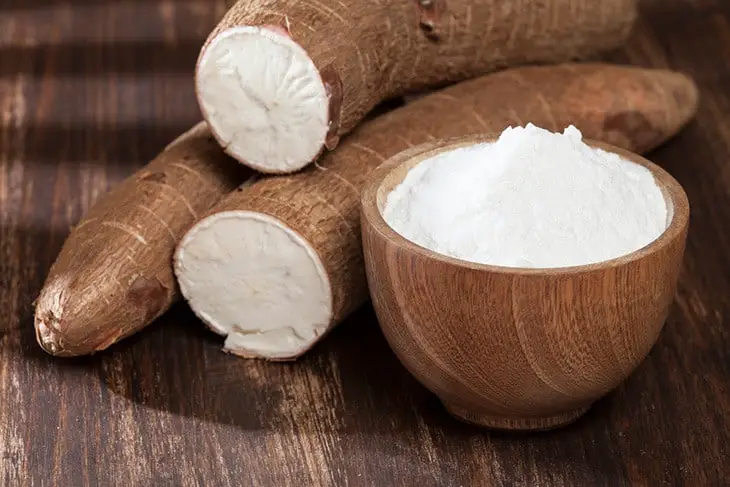
Tapioca flour, or cassava flour, is a gluten-free substitute made from cassava root. The ingredient is widely used in different dishes around the world, including the well-known boba tea. That’s right! Where do you think bobas come from? Tapioca!
While tapioca starch lacks the earthy flavor like potato flour, its high water-absorbing properties make it an excellent substitute for baked goods.
Since it contains no gluten, you can use it for your gluten-free baking. The pastries will still taste just as good with a slight sweet-savory from the tapioca.
The health benefits of tapioca flour include:
- Calcium for your bones
- Iron that aids in oxygen transportation
- No saturated fat, which is good for your heart and arteries.
- Gluten-free
- Good for those with digestive problems
4. Arrowroot Starch
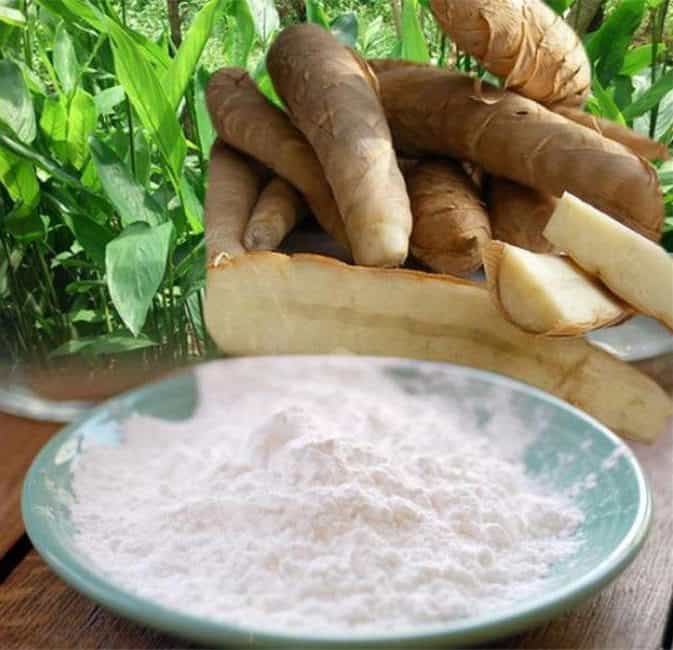
The arrowroot starch, also known as Maranta Arundinacea, a native plant in Indonesia, is another gluten-free ingredient on today’s list. Even though it has similar uses to cornstarch and tapioca flour, not many people know about this ingredient.
A great thing about this ingredient is how close it can get to tasting like potato flour. The earthy aroma makes it go extremely well with pastries, from bread to pizza dough and even pies. It can blend in easily with other flours, providing a comparable texture to potato flour.
In terms of being a thickening agent, arrowroot starch scores once again. We were surprised to find how similar it is to potato flour.
The health benefits of arrowroot starch include:
- Gluten-free
- Rich in B-vitamin to reduce the risk of cardiovascular diseases and boost HDL cholesterol
- Support healthy digestion
- The potent source of B-complex vitamins promotes a better metabolic rate
- Drinks from arrowroot starch for post and pre-workout boost energy levels and stamina
5. Rice Flour
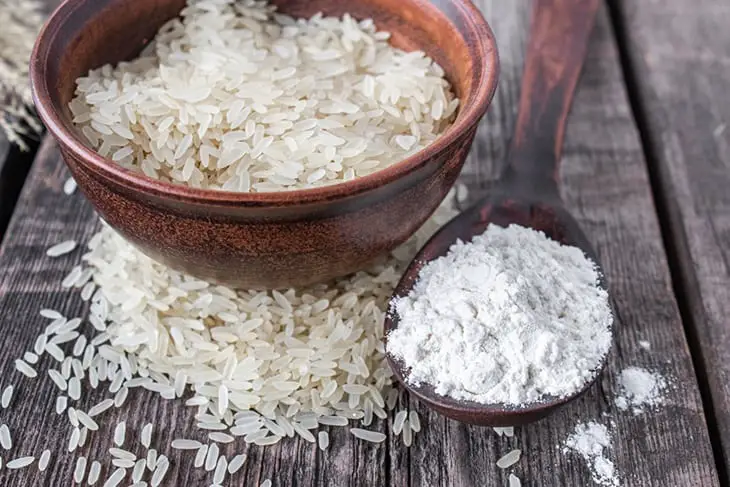
Rice flour has to be one of the most accessible potato flour substitutes since it is a widespread household ingredient.
It is made from ground raw rice with a high scratch level. Despite its dense and heavy structure, the ingredient comes out as a weak thickener.
It creates baked goods with a light and airy texture. Plus, its subtle sweetness is just enough to make your pastries taste like heaven without overwhelming other ingredients.
The health benefits of rice flour include:
- Rich source of vitamin B
- Gluten-free, safe for those with nut allergies or celiac disease
- It’s even better if you’re using brown rice flour because the rich fiber source aids in improving your digestive health.
6. Quinoa Flour
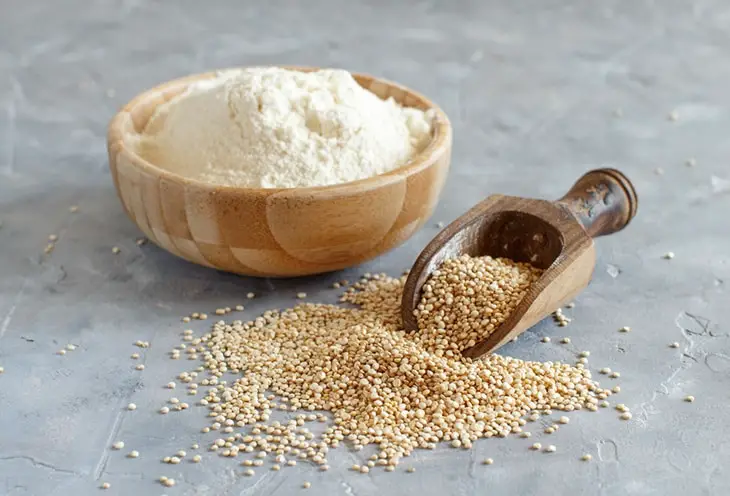
Quinoa flour is made from finely grounded quinoa seeds. This ingredient, apart from being one of the most popular health foods in the world, is an excellent alternative to potato flour.
This plant-based substitution is vegan-friendly and gluten-free, meaning you can use it if you’re on a strict diet or simply just want to lose weight. However, you may not like the distinct taste of quinoa. The bitterness and earthy aftertaste can be somewhat overwhelming, so the ingredient should be used in careful moderation. That’s the case when using quinoa flour in baking.
If you’re just using quinoa flour to thicken gravy or sauce, the flavor distinction won’t be that much of a problem.
The health benefits of quinoa flour include:
- High in protein since it contains all nine essential amino acids
- Gluten-free
- Low glycemic index for longer filling
- High in antioxidants to help neutralize free radicals, which are the main source of cancer in your cells
With these numerous benefits of quinoa, we suggest you substitute it for potato flour more often or even replace it completely.
7. All-Purpose Flour
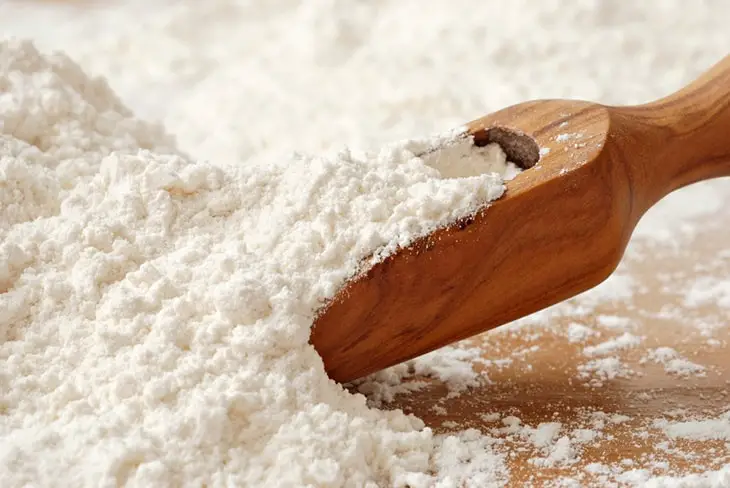
You can substitute all-purpose flour for potato flour if you’re in a rush and agree to entirely forget the benefits of starch.
Since all-purpose flour can’t absorb liquid like potato flour, you would want to be careful when applying water. When using this type of flour to make baked goods, remember that the result won’t come out the same type of chewiness as using potato flour, but rather denser.
All-purpose flour can be used as a thickener; however, you will have to let it cook for a while, or the sauce will taste grainy.
One thing to keep in mind is that this substitute doesn’t have any health benefits. It’s a decent alternative, but only when you’re in a rush.
All-purpose flour has no nutritional value. One reason why bakers use it is that it has an almost unlimited shelf life, making it ideal to use whenever.
8. Wheat Flour
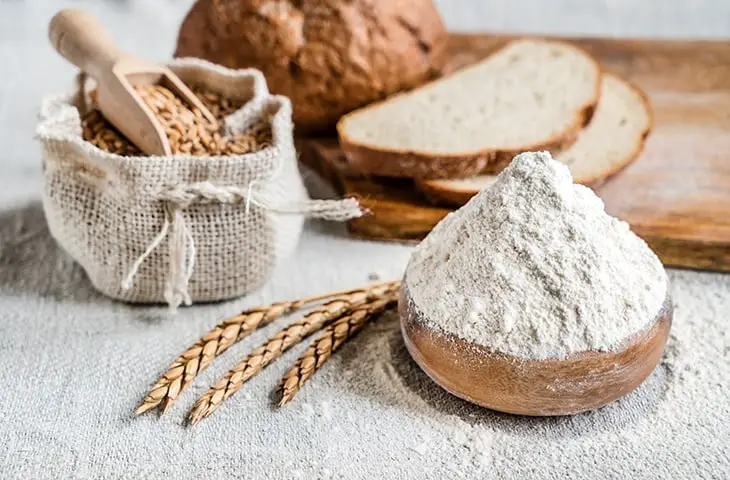
Wheat flour may not be the first ingredient to come to mind in terms of baking, but it is a good quick substitute if you can’t get your hands on potato flour.
It aids in the process of yeast raising when combining with other flours; however, it doesn’t have the ability to retain moisture.
This ingredient is a good alternative if you plan to eat the pastries within the day. Or else, it is still a better idea to regularly check on your potato flour and refill when needed.
Also, wheat flour adds a nutty, mild flavor to the baked goods, whereas potato flour brings an earthy taste. So, if you’re looking for that distinctive flavor, you may end up disappointing yourself.
The health benefits of wheat flour include:
- Full of antioxidants like alkylresorcinols and lignans for decreasing risks of overweight, obesity, and colon cancer.
- Insoluble fiber for feeding the beneficial gut bacterias.
- Rich sources of niacin, calcium, iron, thiamine, and vitamin B6.
9. Potato Flakes
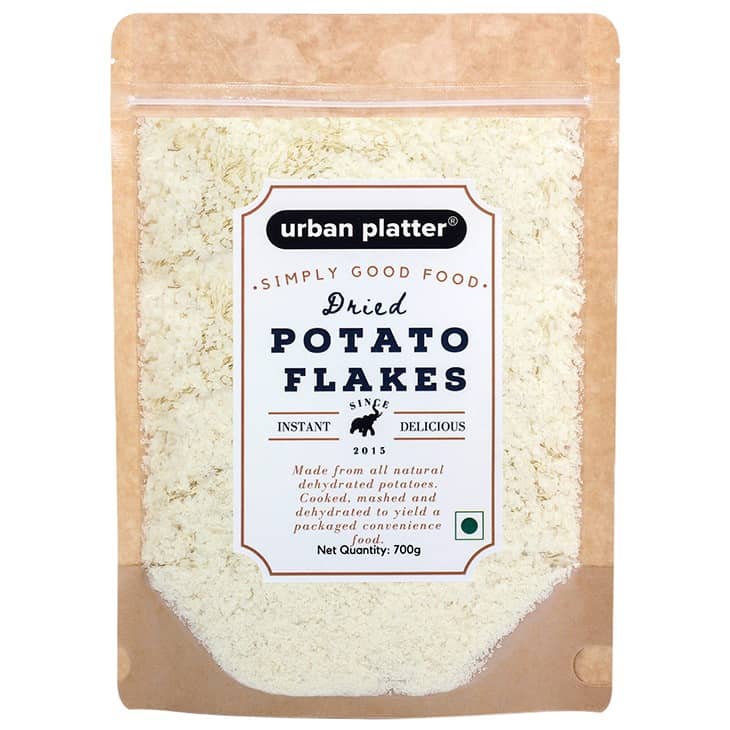
You can also make use of the potatoes in your fridge by turning them into potato flakes. With the right measurement, they’re interchangeable with potato flour.
Essentially, potato flakes are potato flour, but not as smooth and fine. That being said, it requires some work before adding the flakes to your dish.
If you’re cooking with packaged potato flakes, use a grinder to grind the flakes nicely. That’s right! You’re turning them into potato flour!
The health benefits of potato flakes include:
- A source of complex carbs, potassium, vitamin C, and vitamin B6
- Hypoallergenic
- Easy to chew and swallow, making a good recommendation for people who are ill or children under two years old
- Aids in better digestive health
10. Coconut Flour
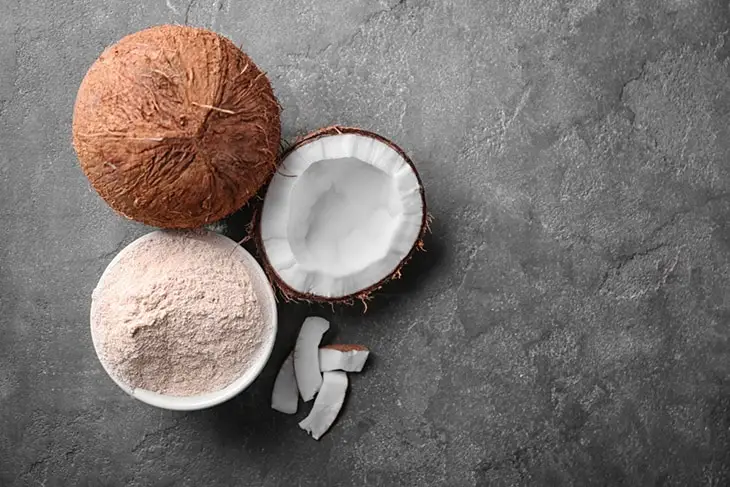
For some of you, this may be the first time you hear of such an ingredient. Well, guess what, not only is it real but also incredibly delicious!
You probably already know what it tastes like. The sweet, tropical aroma of coconut will add a whole new grade to your baked goods, filling them up with depth and savory of a mild sweet taste.
Due to the distinct flavor, don’t add too much coconut flour to your recipe as it can overpower other ingredients. Unless you’re a big coconut fan and want your bread to taste like it, go ahead and do that.
Adding a little bit of coconut flour into your baking recipes can make a whole lot of difference. You will be blown away by these indulgent treats from this ingredient!
The health benefits of coconut flour include:
- Gluten-free
- Rich in fiber and MCTs for healthy blood sugar level
- Improve digestion thanks to the fiber
- Great for those who are on a diet since coconut makes you feel full longer
Frequently Asked Questions
Why Should You Add Potato Flour to Your Baked Goods?
Apart from the savory taste it brings, potato flour is added to pastries because of its ability to lock in moisture. The flavors of potatoes enhance the overall taste of the baked goods and make them irresistible.
Plus, the scratch in potato flour aids in making the bread soft with a chewy texture. The best thing is, your bread won’t go stale for a few days since the flour retains moisture well.
Can You Make Potato Flour at Home?
Absolutely! In fact, potato flour is super easy to make. The process may be time-consuming, but it is definitely worth it. Here’s how to make your own batch at home:
- Peel your potatoes (two big ones should be enough) and cut them into thin strips.
- With a mandolin, cut the strips into pieces; the thinner, the better.
- Put a paper towel on your baking tray, and lay the cut pieces on top.
- Place the tray under direct sunlight for an hour, then flip the potatoes so that both sides dry evenly. Repeat this step 3-4 times.
- Now that your potatoes are completely dried out, use your hands to crush them, then grind until they turn into fine powder.
And that’s it! Your potato flour is ready to be used.
Is Sweet Potato Flour the Same as Potato Flour?
Even though the ingredients both have the word ‘potato’ in them, they’re very much different. Sweet potato flour is sweeter than potato flour due to having a higher percentage of sugar.
Many bakers take advantage of this and use sweet potato flour as a natural sweetener for their desserts. Surely, just like potato flour, this ingredient makes a great thickening agent as it also contains starch.
Is Potato Flour the Same as Potato Starch?
Once again, don’t let the names fool you!
While potato flours are made from dried, crushed, and grounded potatoes, potato starch is just, starch. It contains no flavor, taste, or even nutritional benefits.
On the other hand, potato flour has all the same flavors, tastes, and nutrition as whole potatoes. The ingredient carries a grass-like, earthy taste that can’t be found anywhere else.
Which is Better: Cornstarch or Potato Starch?
Essentially, cornstarch and potato starch serve the same purpose: thickening sauces and making food crispy.
However, cornstarch is higher in calories and carbohydrates than potato scratch. So, it makes a good alternative for those who are trying to cut down on the daily calorie intake.
In case you’re trying to minimize your carb intake, potato scratch is the better option.
What is Potato Flour Good For?
Potato flour is a great ingredient. Not only is it incredibly flavorful but it can also be used in a variety of dishes.
For instance, making your waffles, or any other pastries, more tasty and hearty with a moderate amount of potato flour. Even better, it can be used as a standalone ingredient to thicken chickpeas with gravy, curry pigeon peas, or other broth-based recipes.
The best thing about this ingredient is that it makes your bread super soft and bouncy.
Is Potato Starch Healthier Than Potato Flour?
As mentioned above, potato starch contains no nutrition or benefits compared to potato flour.
In Closing
There you have it, substitute for potato flour. It can be quite challenging choosing an alternative to this ingredient, but we got everything done for you!
The substitutions from the list above are all worthy, but we highly recommend quinoa flour due to its immense beneficial factors. Otherwise, you can also go for mashed potatoes if you want the closest flavor to potato flour.
Should you have any other questions, feel free to let us know in the comment section. Thank you for reading!

